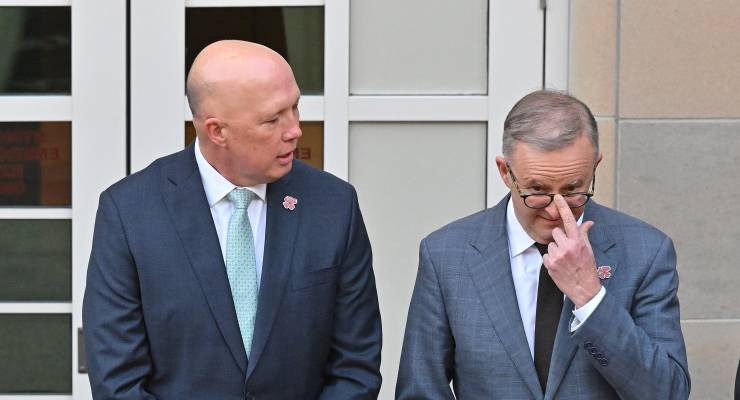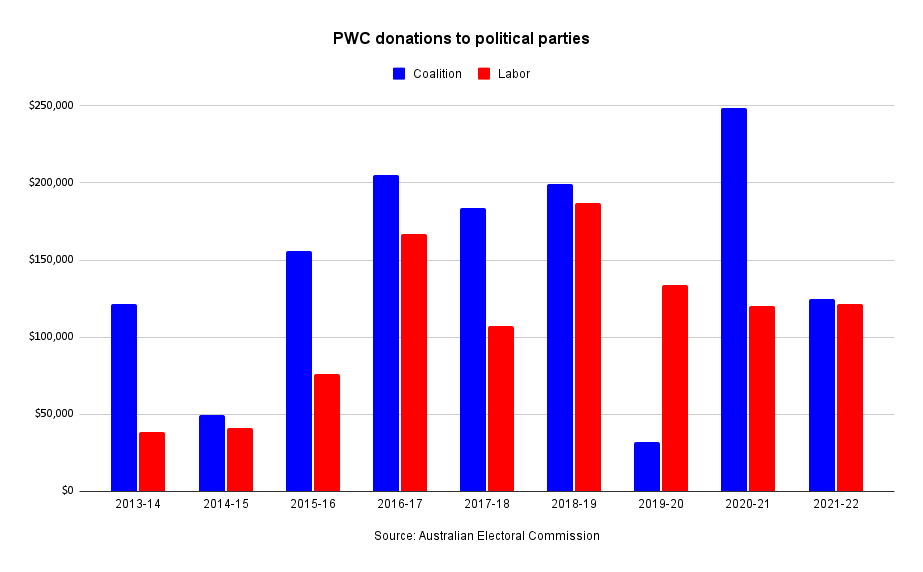
If big consulting firms have done very well out of the federal government over the past decade, the major political parties have — relatively speaking — done very well from them in return. In May, the Centre for Public Integrity calculated that the big four audit/consulting firms had handed over $4 million in donations and other contributions to the major parties since 2012.
Biggest among the big four is PwC — it has provided more than half of all donations in that time, conveniently given it is also the biggest supplier of consultancy services to the Commonwealth over the past decade, according to Australian National Audit Office data, having secured $420 million in taxpayer funds.
You could see this as a generous return on investment — spend $4 million, get $420 million, nice work if you can get it — but that ignores that the big four don’t just provide services to governments, but provide services to private clients who are themselves affected by government policy. So there’s a double conflict of interest in big four donations that is unique to those firms: they are not merely seeking advantage for themselves but also for their non-government clients. Donations yield access to political decision-makers, so the more you want to both influence and obtain information from decision-makers on behalf of other clients, the more you need to get access to them.

PwC has always understood on which side its political bread was buttered: over the past decade it has favoured the Coalition with its contributions, giving about a third more to the conservatives than to Labor, with only one year — 2019-20 — when the bias was reversed. It has also shared the love at the state level — it has given more than $110,000 to NSW party branches, $200,000 to Queensland parties and more than $300,000 to Victorian parties. PwC has also upped its contributions over time, suggesting there is indeed a link between more donations and more consulting work.
But as we now know, from 2015 on PwC was using confidential information, shared by the government in consultations on proposed changes to multinational tax rules, to try to sell specialist tax advice to multinationals to prevent them from paying additional tax.
The outrage that this has occasioned relates almost entirely to the breach of confidence that was committed by the disgraced tax partner Peter Collins, and other partners who cooperated with him in his endeavours. Missing is the focus on something equally outrageous, but which is entirely normalised — a firm that enjoys hundreds of millions of taxpayer dollars in government contracts routinely, as a core and lucrative part of its business, also advises companies on how to avoid paying tax to the same government.
PwC and the other big firms will plead that consultants and auditors and tax planners are all separate arms of the firm, and that its splendid consulting staff are being unfairly punished for the sins of those in other areas with whom they have no connection and share no information.
To which the logical response is: prove it, by splitting off those functions into different firms. Despite at least two of the big four proposing such a structural separation to end the persistent problem of their deeply embedded conflicts of interest, none so far has taken that step.
Meanwhile, are Labor, the Liberals and the Nationals continuing to take cash from a firm with such an atrocious record regarding taxpayers and integrity? The firm was in sufficiently bad odour to have to pull its sponsorship of Labor’s budget night fundraiser in May, but we’ll have to wait until February to find out what it has given to parties in the financial year ending in a couple of weeks.
Refusing to accept money from PwC — and the other big consulting firms — would be one way of reducing the systematic conflict of interest that characterises any work those firms do for governments.
More appropriately, if political parties were committed to integrity, they’d hand back PwC’s money, at least from 2015 onwards, when the firm was working so diligently to undermine the interests of Australian taxpayers.
Should the major political parties return the money given to them by PwC? Let us know your thoughts by writing to letters@crikey.com.au. Please include your full name to be considered for publication. We reserve the right to edit for length and clarity.








Effectively, this amounts to the laundering of the transfer of public funds to the political party currently in government.
There are two fundamental issues here. 1. Political parties cannot fund themselves from tithes given by individual voters, so they have to sell influence and preferential treatment to corporates and organisations. 2. There is a deep belief that governments can’t do anything as well as the private sector and they should not even try. As with all faiths, this belief is as unshakeable as it is wrong.
True. Before we had this need for consultancies governments managed very well on their own strengths. Since this consultant crap
governments abilties have gone down the toilet because they are afraid to make a decision without it having been run past at least
one consultancy firm who are only in it for themselves and how much they can make from our tax dollars.
Time governments learned to stand on their own because that’s who the voters voted into office, not one consulting firm appeared
on the ballot box, so using them is not what the public asked for. If your ministers cannot make policies on their own, they have the
knowledge of the public service to call on. Which leads to other positions that should go – advisors within each office. Typists, and
the usual office staff are acceptable but advisors seem to be everywhere but are not much good or there wouldn’t be the need for
outside firms as well. The amount of money wasted on all this advice would fund welfare in so many departments and housing
would be a doddle with all that extra money in the public purse, where it belongs. No wonder there’s not enough for essential
services, it’s going to these firms and fossil fuel companies at the cost of lives.
Hand it back? Haven’t we already given PWC enough money? Couldn’t we put it into community housing instead?
But look what they’ve given us back – for our ‘money’s worth’.
Taking donations from the Big Four is equal to taking donations from Big Tobacco – both contain cancer causing agents harmful to our body politic.
Like wise they should be banned them in public places.
For the health of the nation, let’s just butt em out.
No more enquiries and committees, or other delaying tactics – we all know it stinks, we all know it stains our democracy and drains our national bank account.
Quit now!
Period.
Seems pretty clear we need to stop dealing with the big 4. They are no-ones friend. Certainly no friends of the Australian taxpayer. Not even friends of the people they bribe. Time to put some of them in jail. Along with some of the people they are bribing.
Rebuild the public service into a fearless independant workforce with the skills required to advise governments in a non partisan manner. And have governments respect that. If thats possible now.